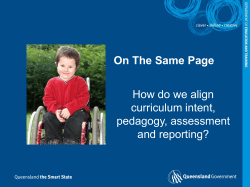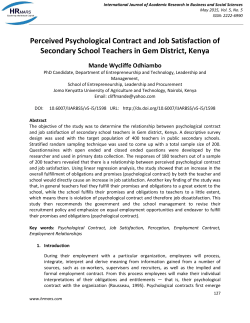
Demystifying the Psycho-Educational Assessment Report Suzanne Pellarin, M.A.
Demystifying the Psycho-Educational Assessment Report Suzanne Pellarin, M.A. Psycho-Educational Consultant, London Catholic District School Board What is a Psycho-Educational Assessment? • A type of psychological report that focuses on assessment and interpretation of educationally related psychological tests and educational tests, including tests of intelligence and cognitive abilities, memory, achievement tests, and measures of behaviour. • It is designed to answer these types of questions: o Does the student have a learning disability, developmental disability, attentional problems? o What are the student’s academic and cognitive abilities, strengths, and weaknesses? Southern LINCs • It yields recommendations relevant for educational planning and may assist with decisions regarding identification and/or placement. • While learning is the primary focus of psycho-educational assessment, behavioural, socio-emotional, and medical issues may also need to be addressed in a psycho-educational assessment. The Basic Components of Psycho-Educational Reports • Background Information • Assessment Techniques (what tests or checklists were administered) • Behavioural Observations • Cognitive Ability & Memory Skills • Academic Functioning • Attention and Behaviour • Executive Functioning • Adaptive Functioning • Conclusions and Recommendations Cognitive Ability & Memory Skills • • • • • Verbal Comprehension Short-Term Auditory Memory Long-Term Verbal Memory and Learning Working Memory Perceptual Reasoning (visual-spatial organization, nonverbal reasoning) • Visual memory • Visual-Motor Coordination • Processing Speed Academic Functioning In this section we may refer to achievement testing completed by the Student Education Resource Teacher (SERT) and/or our own achievement testing. Achievement tests are designed to determine the student’s degree of knowledge and proficiency in a specific area or set of areas, such as: • Reading • Writing • Math Attention and Behaviour • • • • • • • • • Inattention Impulsivity/Hyperactivity Rule-breaking, Opposition, Conduct Problems Aggression Anxiety, Depression, Withdrawal Somatic complaints Atypicality, Social Problems, Thought Problems Leadership Internalizing vs. Externalizing Behaviours Executive Functioning • “Executive functions” is a term used to describe the many different cognitive processes that students use to control their behavior and to connect past experience with present action. • Students rely on executive functions to perform activities such as planning, organizing, strategizing, paying attention to and remembering details, and managing time and space. LD@school Adaptive Functioning • Adaptive functioning or behavior reflects an individual’s social and practical competence of daily skills to meet the demands of everyday living. • Adaptive behavior includes the age-appropriate behaviors necessary for people to live independently and to function safely and appropriately in daily life. Wikipedia • Adaptive behaviors include real life skills such as grooming, dressing, safety, safe food handling, school rules, ability to work, money management, cleaning, making friends, social skills, and personal responsibility. about.com Learning Disabilities The measurement techniques used in psychological reports are norm-referenced and standardized. Standardized • During the standardization process, the test is given to a large number of students from various backgrounds to determine what is average, low average, high average, etc. • This allows us to compare a child’s scores to thousands of other students who were part of the normative sample. Norm-Referenced • The scores generated give the student’s relative standing in a group. • How does the student compare to others his age? • Allows us to make statements like: “Is average compared to his peers.” • The EQAO Standardized Tests, Ontario Curriculum, and PM Benchmarks are not norm-referenced. • They are criterion referenced. o Authorities or experts decide what children should be doing at each grade level. o Not: What can the average child do. Norms can be reported as: • Percentile rank • Standard score • IQ About.com Learning Disabilities • Percentile Ranks indicate how well a student performed compared to other students his/her age. A percentile rank of 50 corresponds to a performance that is as good as, or better than, 50% of one’s same-aged peers. Average percentile ranks fall between 25 and 75. • Standard Scores compare one student's performance on a test to the performance of other students her age. Standard scores estimate whether a student's scores are above average, average, or below average compared to peers. They also enable comparison of a student's scores on different types of tests. • An intelligence quotient, or IQ, is a score derived from a standardized test designed to assess intelligence. In most IQ tests, the mean (average) score within an age group is set to 100 and the standard deviation SD is 15. (The SD shows how much variation or exists from the average.) Possible Outcomes of Psycho-Educational Assessment • A Psychological Diagnosis such as, o Learning Disability o Developmental Disability o Attention Deficit Hyperactivity Disorder • No diagnosis o Terms such as Slow Learner or Gifted are NOT psychological or diagnostic terms. o We might suggest another condition or disorder that it outside of our expertise and suggest further investigation Learning Disability Definition as per the Learning Disabilities Association of Ontario • “Learning Disabilities” refers to a variety of disorders that affect the acquisition, retention, understanding, organization or use of verbal and/or non-verbal information. • These disorders result from impairments in one or more psychological processes related to learning (a), in combination with otherwise average abilities essential for thinking and reasoning. • Learning disabilities are specific not global impairments and as such are distinct from intellectual disabilities. • Learning disabilities range in severity and invariably interfere with the acquisition and use of one or more of the following important skills: • oral language (e.g., listening, speaking, understanding) • reading (e.g., decoding, comprehension) • written language (e.g., spelling, written expression) • mathematics (e.g., computation, problem solving) Learning Disabilities Association of Ontario (LDAO) What do we mean by Psychological Processes? • While performing any kind of activity we use various processes like thinking, remembering, problem solving, reasoning etc. When we study a lesson, watch a movie, talk on a topic, we are using psychological processes of which we may or may not be aware. studymode.com • Refers to an evolving list of cognitive functions. To date, research has focused on functions such as: o o o o o o o phonological processing memory and attention processing speed language processing perceptual-motor processing visual-spatial processing working memory/executive functions LDAO Learning Disability Definition as per the Ontario Ministry of Education • A learning disorder evident in both academic and social situations that involves one or more of the processes necessary for the proper use of spoken language or the symbols of communication, and that is characterized by a condition that: • Is not primarily the result of Impairment of vision; Impairment of hearing; Physical disability; primary emotional disturbance; Cultural difference; • Results in a significant discrepancy between academic achievement and assessed intellectual ability, with deficits in one or more of: Receptive language (listening, reading); Language processing (thinking, conceptualizing, integrating); Expressive language (talking, spelling, writing); Mathematical computations. • May be associated with one or more conditions diagnosed as: Perceptual handicap; brain injury, Minimal brain dysfunction, Dyslexia or Developmental aphasia. Ontario Ministry of Education Accommodation • Changes how the content is • taught, • made accessible, and/or • assessed. Accommodations DO NOT change what the student is expected to master. The objectives of the course/activity remain intact. Modification • Also changes how the content is: • taught, • made accessible, and/or • assessed. Modifications DO change what the student is expected to master. Course/activity objectives are modified to meet the needs of the learner. Accommodation (examples) • • • • • • One-to-one or small group instruction Extended time on assignments and/or assessments Braille or large print materials Shortened assignments and/or assessments Slant boards or study carrels Oral administration of subject-area tasks that do not assess decoding/reading comprehension • Technologies such as speech-to-text Modifications (examples) • Instruction that focuses on selected curriculum outside of grade level • Changes in the scoring rubrics or grading scale • Reducing the complexity of the activity (e.g., only one step as opposed to multiple steps to solve a problem) • Cueing or prompting the student during a grade-level activity MODIFICATION = What ACCOMMODATION = How Conclusion We write these reports for parents, teachers, and even the students themselves in the hopes that the information will be helpful in understanding how the student learns and what strengths you can draw on to circumvent any processing deficits. When we give recommendations we are typically thinking of the student at their current age. We want the information in our reports to be helpful throughout their school careers and we encourage parents, teachers and high school students to ask for a review of the assessment report and an update of recommendations at any time.
© Copyright 2025



















